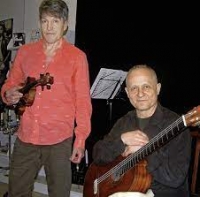Latest Sheet Music
W.A. Mozart

Wolfgang Amadeus Mozart (German: , full baptismal name Johannes Chrysostomus Wolfgangus Theophilus Mozart (27 January 1756 – 5 December 1791), was a prolific and influential composer of the Classical era. He composed over 600 works, many acknowledged as pinnacles of symphonic, concertante, chamber, piano, operatic, and choral music. He is among the most enduringly popular of classical composers.
Mozart showed prodigious ability from his earliest childhood in Salzburg. Already competent on keyboard and violin, he composed from the age of five and performed before European royalty; at 17 he was engaged as a court musician in Salzburg, but grew restless and traveled in search of a better position, always composing abundantly. While visiting Vienna in 1781, he was dismissed from his Salzburg position. He chose to stay in the capital, where he achieved fame but little financial security. During his final years in Vienna, he composed many of his best-known symphonies, concertos, and operas, and the Requiem. The circumstances of his early death have been much mythologized. He was survived by his wife Constanze and two sons.
Mozart learned voraciously from others, and developed a brilliance and maturity of style that encompassed the light and graceful along with the dark and passionate—the whole informed by a vision of humanity "redeemed through art, forgiven, and reconciled with nature and the absolute." His influence on subsequent Western art music is profound. Beethoven wrote his own early compositions in the shadow of Mozart, of whom Joseph Haydn wrote that "posterity will not see such a talent again in 100 years."
Mozart showed prodigious ability from his earliest childhood in Salzburg. Already competent on keyboard and violin, he composed from the age of five and performed before European royalty; at 17 he was engaged as a court musician in Salzburg, but grew restless and traveled in search of a better position, always composing abundantly. While visiting Vienna in 1781, he was dismissed from his Salzburg position. He chose to stay in the capital, where he achieved fame but little financial security. During his final years in Vienna, he composed many of his best-known symphonies, concertos, and operas, and the Requiem. The circumstances of his early death have been much mythologized. He was survived by his wife Constanze and two sons.
Mozart learned voraciously from others, and developed a brilliance and maturity of style that encompassed the light and graceful along with the dark and passionate—the whole informed by a vision of humanity "redeemed through art, forgiven, and reconciled with nature and the absolute." His influence on subsequent Western art music is profound. Beethoven wrote his own early compositions in the shadow of Mozart, of whom Joseph Haydn wrote that "posterity will not see such a talent again in 100 years."
Mozart

Wolfgang Amadeus Mozart, full name Johann Chrysostom Wolfgang Amadeus Mozart (27 January 1756 â 5 December 1791) was a prolific and influential composer of the Classical era. His over 600 compositions include works widely acknowledged as pinnacles of symphonic, concertante, chamber, piano, operatic, and choral music. Mozart is among the most enduringly popular of classical composers, and many of his works are part of the standard concert repertoire.
Mozart's music, like Haydn's, stands as an archetypal example of the Classical style. His works spanned the period during which that style transformed from one exemplified by the style galant to one that began to incorporate some of the contrapuntal complexities of the late Baroque, complexities against which the galant style had been a reaction. Mozart's own stylistic development closely paralleled the development of the classical style as a whole. In addition, he was a versatile composer and wrote in almost every major genre, including symphony, opera, the solo concerto, chamber music including string quartet and string quintet, and the piano sonata. While none of these genres were new, the piano concerto was almost single-handedly developed and popularized by Mozart. He also wrote a great deal of religious music, including masses; and he composed many dances, divertimenti, serenades, and other forms of light entertainment.
The central traits of the classical style can be identified in Mozart's music. Clarity, balance, and transparency are hallmarks of his work.
Mozart's music, like Haydn's, stands as an archetypal example of the Classical style. His works spanned the period during which that style transformed from one exemplified by the style galant to one that began to incorporate some of the contrapuntal complexities of the late Baroque, complexities against which the galant style had been a reaction. Mozart's own stylistic development closely paralleled the development of the classical style as a whole. In addition, he was a versatile composer and wrote in almost every major genre, including symphony, opera, the solo concerto, chamber music including string quartet and string quintet, and the piano sonata. While none of these genres were new, the piano concerto was almost single-handedly developed and popularized by Mozart. He also wrote a great deal of religious music, including masses; and he composed many dances, divertimenti, serenades, and other forms of light entertainment.
The central traits of the classical style can be identified in Mozart's music. Clarity, balance, and transparency are hallmarks of his work.
Real Book

The Real Book refers to compilations of lead sheets for jazz standards. It usually refers to the first volume of a series of books transcribed and collated by Berklee College of Music students during the 1970s.The name is derived from "fake books", so called because they contained only rough outlines of music pieces rather than fully notated scores. Early fake books were often used by professional bands who performed mostly standards, often more geared to society and dance bands rather than jazz ensembles, and devoted much space to show tunes, novelty tunes, traditional jazz, etc. The first three Real Book volumes, in contrast, contained many bebop and other jazz standards that were likely to be encountered on jazz gigs at the time. For this reason, the books were quickly adopted among jazz players in the 1970s, particularly on the east coast.
Cool

Cool (Korean: 쿨) is a South Korean co-ed K-pop group that debuted in 1994.[1They debuted in 1994 as "Why You Wanted to Be". In the 1st album, Kim Sung-soo, Lee Jae-hoon, Yu Chae-young and Choi Jun-myung were four, but from the second album, Yoo Chae-young and Choi Jun-Myeong withdrew and while female member Yuri joined them, Kim Sung-soo and Lee Jae-hoon together acted as a three-member group.
Michael Schmid

Michael Schmid is a musician and flutist specializing in contemporary experimental music. A fixed member of the Belgian Ictus Ensemble and as freelancer he has worked with most of the major European New Music Ensembles as chamber musician and soloist.
Traditional

Yiruma

Yiruma (born February 15 1978, Seoul, Korea) is a South Korean piano music composer. He is married to Son Hye-im.
Yiruma is well-known throughout the world, and his albums are sold all over Asia, as well as the United States and Europe. His most famous pieces are "Kiss the Rain", and also "River Flows in You". These pieces are widely mistaken for being associated with the movie Twilight. Although he formerly held dual citizenship as a citizen of the United Kingdom and South Korea, in July 2006 he gave up his British citizenship and entered the Republic of Korea Navy to begin his military service, which is compulsory for all male South Koreans. He has lived in Osaka, Japan for 5 years to promote album sales before giving up his dual citizenship.
Yiruma is well-known throughout the world, and his albums are sold all over Asia, as well as the United States and Europe. His most famous pieces are "Kiss the Rain", and also "River Flows in You". These pieces are widely mistaken for being associated with the movie Twilight. Although he formerly held dual citizenship as a citizen of the United Kingdom and South Korea, in July 2006 he gave up his British citizenship and entered the Republic of Korea Navy to begin his military service, which is compulsory for all male South Koreans. He has lived in Osaka, Japan for 5 years to promote album sales before giving up his dual citizenship.
Journey
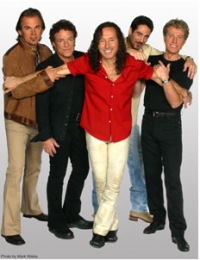
Journey is an American rock band formed in San Francisco, California in 1973.
The band has gone through several phases since its inception by former members of Santana. The band's greatest commercial success came in the late 1970s through the early 1980s with a series of power ballads and songs such as "Don't Stop Believing", "Any Way You Want It", "Faithfully", "Open Arms", "Separate Ways", and "Wheel in the Sky."
Journey has been eligible for induction into the Rock & Roll Hall of Fame since 2000, but Gregg Rolie is currently the only member of Journey who has been inducted—as a member of parent band Santana. In 2009, Steve Perry, the band's best-known lead vocalist, will be eligible for induction as a solo artist.
Current members:
Neal Schon - Lead & rhythm guitars, backing vocals, lead vocals (1973-present)
Ross Valory - Bass, backing vocals, lead vocals (1973-1985, 1995-present)
Jonathan Cain - Piano, keyboards, harmonica, rhythm guitar, backing vocals, lead vocals (1980-present)
Deen Castronovo - Drums, percussion, backing vocals, lead vocals (1998-present)
Arnel Pineda - Lead vocals (2007-present)
The band has gone through several phases since its inception by former members of Santana. The band's greatest commercial success came in the late 1970s through the early 1980s with a series of power ballads and songs such as "Don't Stop Believing", "Any Way You Want It", "Faithfully", "Open Arms", "Separate Ways", and "Wheel in the Sky."
Journey has been eligible for induction into the Rock & Roll Hall of Fame since 2000, but Gregg Rolie is currently the only member of Journey who has been inducted—as a member of parent band Santana. In 2009, Steve Perry, the band's best-known lead vocalist, will be eligible for induction as a solo artist.
Current members:
Neal Schon - Lead & rhythm guitars, backing vocals, lead vocals (1973-present)
Ross Valory - Bass, backing vocals, lead vocals (1973-1985, 1995-present)
Jonathan Cain - Piano, keyboards, harmonica, rhythm guitar, backing vocals, lead vocals (1980-present)
Deen Castronovo - Drums, percussion, backing vocals, lead vocals (1998-present)
Arnel Pineda - Lead vocals (2007-present)
Final Fantasy VIII

Final Fantasy VIII (ファイナルファンタジーVIII Fainaru Fantajī Eito) is a role-playing video game developed and published by Square for the PlayStation console. Released in 1999, it is the eighth main installment in the Final Fantasy series. Set on an unnamed fantasy world with science fiction elements, the game follows a group of young mercenaries, led by Squall Leonhart, as they are drawn into a conflict sparked by the sorceress Edea. After defeating Edea, the protagonists learn that she was under the control of Ultimecia, a sorceress from the future who wishes to compress time. During the quest to defeat Ultimecia, Squall struggles with his role as leader and develops a romance with one of his comrades, Rinoa Heartilly.
Development began in 1997, during the English localization of Final Fantasy VII. The game builds on the visual changes brought to the series by Final Fantasy VII, including use 3D graphics and pre-rendered backgrounds, while also departing from many Final Fantasy traditions. It is the first Final Fantasy to use realistically proportioned characters consistently, feature a vocal piece as its theme music, forego the use of magic points for spellcasting, and deviate from the series' traditional means of increasing a character's power.
Final Fantasy VIII was mostly well received by critics, who praised its originality and visuals while criticizing some of its gameplay elements. It was voted the 22nd-best game of all time in 2006 by readers of the Japanese magazine Famitsu. The game was a commercial success; 13 weeks after its release, Final Fantasy VIII had earned more than US$50 million in sales, making it the fastest-selling Final Fantasy title until Final Fantasy XIII, a multi-platform release. It was later ported to Windows-based personal computers and became available on PlayStation Network as a PSone Classics title in 2009. As of December 2013, it has sold more than 8.5 million copies worldwide.
Development began in 1997, during the English localization of Final Fantasy VII. The game builds on the visual changes brought to the series by Final Fantasy VII, including use 3D graphics and pre-rendered backgrounds, while also departing from many Final Fantasy traditions. It is the first Final Fantasy to use realistically proportioned characters consistently, feature a vocal piece as its theme music, forego the use of magic points for spellcasting, and deviate from the series' traditional means of increasing a character's power.
Final Fantasy VIII was mostly well received by critics, who praised its originality and visuals while criticizing some of its gameplay elements. It was voted the 22nd-best game of all time in 2006 by readers of the Japanese magazine Famitsu. The game was a commercial success; 13 weeks after its release, Final Fantasy VIII had earned more than US$50 million in sales, making it the fastest-selling Final Fantasy title until Final Fantasy XIII, a multi-platform release. It was later ported to Windows-based personal computers and became available on PlayStation Network as a PSone Classics title in 2009. As of December 2013, it has sold more than 8.5 million copies worldwide.
Tchaikovsky

Pyotr Il'yich Tchaikovsky (May 7 1840 â November 6 1893) was a Russian composer of the Romantic era. While not part of the nationalistic music group known as "The Five", Tchaikovsky wrote music which, in the opinion of Harold Schonberg, was distinctly Russian: plangent, introspective, with modally-inflected melody and harmony.
Aesthetically, Tchaikovsky remained open to all aspects of Saint Petersburg musical life. He was impressed by Serov and Balakirev as well as the classical values upheld by the conservatory. Both the progressive and conservative camps in Russian music at the time attempted to win him over. Tchaikovsky charted his compositional course between these two factions, retaining his individuality as a composer as well as his Russian identity. In this he was influenced by the ideals of his teacher Nikolai Rubinstein and Nikolai's brother Anton.
Tchaikovsky's musical cosmopolitanism led him to be favored by many Russian music-lovers over the "Russian" harmonies and styles of Mussorgsky, Borodin and Rimsky-Korsakov.
Nonetheless he frequently adapted Russian traditional melodies and dance forms in his music, which enhanced his success in his home country. The success in St. Petersburg at the premiere of his Third Orchestral Suite may have been due in large part to his concluding the work with a polonaise. He also used a polonaise for the final movement of his Third Symphony.
Aesthetically, Tchaikovsky remained open to all aspects of Saint Petersburg musical life. He was impressed by Serov and Balakirev as well as the classical values upheld by the conservatory. Both the progressive and conservative camps in Russian music at the time attempted to win him over. Tchaikovsky charted his compositional course between these two factions, retaining his individuality as a composer as well as his Russian identity. In this he was influenced by the ideals of his teacher Nikolai Rubinstein and Nikolai's brother Anton.
Tchaikovsky's musical cosmopolitanism led him to be favored by many Russian music-lovers over the "Russian" harmonies and styles of Mussorgsky, Borodin and Rimsky-Korsakov.
Nonetheless he frequently adapted Russian traditional melodies and dance forms in his music, which enhanced his success in his home country. The success in St. Petersburg at the premiere of his Third Orchestral Suite may have been due in large part to his concluding the work with a polonaise. He also used a polonaise for the final movement of his Third Symphony.
Regina Spektor

Regina Spektor (born February 18, 1980) is a Soviet-born Jewish-American singer-songwriter and pianist. Her music is associated with the anti-folk scene centered on New York City's East Village.
Spektor has said that she has created 700 songs, but that she rarely writes any of them down. She has also stated that she never aspired to write songs herself, but songs seem to just flow to her. Spektor possesses a broad vocal range and uses the full extent of it. She also explores a variety of different and somewhat unorthodox vocal techniques, such as verses composed entirely of buzzing noises made with the lips and beatbox-style flourishes in the middle of ballads, and also makes use of such unusual musical techniques as using a drum stick to tap rhythms on the body of the piano or chair.
Her lyrics are equally eclectic, often taking the form of abstract narratives or first-person character studies, similar to short stories or vignettes put to song. Spektor usually sings in English, though she sometimes includes a few words or verses of Latin, Russian, French, and other languages in her songs.
Spektor has said that she has created 700 songs, but that she rarely writes any of them down. She has also stated that she never aspired to write songs herself, but songs seem to just flow to her. Spektor possesses a broad vocal range and uses the full extent of it. She also explores a variety of different and somewhat unorthodox vocal techniques, such as verses composed entirely of buzzing noises made with the lips and beatbox-style flourishes in the middle of ballads, and also makes use of such unusual musical techniques as using a drum stick to tap rhythms on the body of the piano or chair.
Her lyrics are equally eclectic, often taking the form of abstract narratives or first-person character studies, similar to short stories or vignettes put to song. Spektor usually sings in English, though she sometimes includes a few words or verses of Latin, Russian, French, and other languages in her songs.
François Couperin
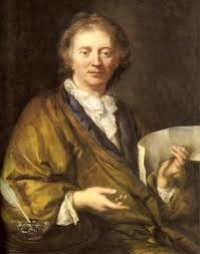
François Couperin (French: ; 10 November 1668 – 11 September 1733) was a French Baroque composer, organist and harpsichordist. He was known as Couperin le Grand ("Couperin the Great") to distinguish him from other members of the musically talented Couperin family.Couperin was born into a prominent musical family. His father Charles was organist at the Church of Saint-Gervais in Paris, a position previously held by Charles's brother Louis Couperin, the esteemed keyboard virtuoso and composer whose career was cut short by an early death. As a boy François must have received his first music lessons from his father, but Charles died in 1679. The church council at Saint-Gervais hired Michel Richard Delalande to serve as new organist on the understanding that François would replace him at age 18.
George Dela rue
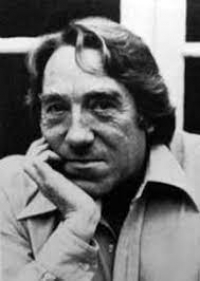
Georges Delerue was a French composer who composed over 350 scores for cinema and television. Delerue won numerous important film music awards, including an Academy Award for A Little Romance, three César Awards, two ASCAP Awards, and one Gemini Award for Sword of Gideon.
Harry Warren
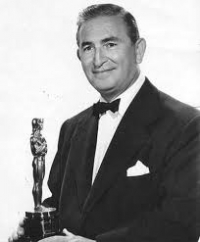
Harry Warren (born Salvatore Antonio Guaragna, December 24, 1893 – September 22, 1981) was an American composer and lyricist. Warren was the first major American songwriter to write primarily for film. He was nominated for the Academy Award for Best Original Song eleven times and won three Oscars for composing "Lullaby of Broadway", "You'll Never Know" and "On the Atchison, Topeka and the Santa Fe". He wrote the music for the first blockbuster film musical, 42nd Street, choreographed by Busby Berkeley, with whom he would collaborate on many musical films.
Duran Duran
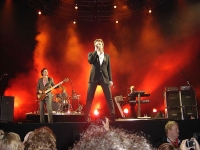
Duran Duran are an English rock band from Birmingham, England. They were one of the most successful of the 1980s bands and a leading band in the MTV-driven "Second British Invasion" of the United States. Since the 1980s they have placed 14 in the Top 10 of the UK Singles Chart and 21 in the Billboard Hot 100 and have sold more than 100 million records. While the group were generally considered part of the New Romantic scene, along with bands such as Spandau Ballet, when they first emerged, they later shed this image. The band worked with fashion designers to build a sharp and elegant image that earned them the nickname "the prettiest boys in rock". The band's controversial videos-which included partial nudity and suggestions of sexuality- became popular in the early 1980s on the then-new music video channel, MTV. The band were among the first bands to have their videos shot by professional directors with 35 mm film movie cameras, which gave their videos a much more polished look. In 1984, the band were early innovators with video technology in their live stadium shows.
The band was created by Nick Rhodes, John Taylor and Stephen Duffy, with the later addition of Roger Taylor and, after numerous personnel changes, Andy Taylor, and Simon Le Bon (none of the Taylors are related.) The group has never disbanded, but the line-up has changed to include guitarist Warren Cuccurullo from 1989 to 2001, and drummer Sterling Campbell from 1989 to 1991. The reunion of the original five members in the early 2000s created a stir among the band's fans and music media. Andy Taylor left the band in summer 2006, and London guitarist Dom Brown has since been working with the band as a session player and touring member. A full time replacement guitarist for Andy Taylor so far has not been appointed.
The band was created by Nick Rhodes, John Taylor and Stephen Duffy, with the later addition of Roger Taylor and, after numerous personnel changes, Andy Taylor, and Simon Le Bon (none of the Taylors are related.) The group has never disbanded, but the line-up has changed to include guitarist Warren Cuccurullo from 1989 to 2001, and drummer Sterling Campbell from 1989 to 1991. The reunion of the original five members in the early 2000s created a stir among the band's fans and music media. Andy Taylor left the band in summer 2006, and London guitarist Dom Brown has since been working with the band as a session player and touring member. A full time replacement guitarist for Andy Taylor so far has not been appointed.
Henry Purcell

Henry Purcell (pronounced /ˈpɜrsəl/; 10 September 1659 (?) – 21 November 1695), was an English organist and Baroque composer of secular and sacred music. Although Purcell incorporated Italian and French stylistic elements into his compositions, his legacy was a uniquely English form of Baroque music.
William Joseph
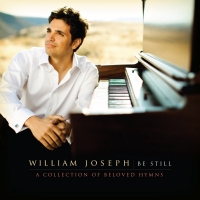
William Joseph Schwartz III better known as William Joseph, is an American pianist and recording artist from Phoenix, Arizona. He has released three studio albums: Within (2004), Beyond (2008) and Be Still (2012)At age 8 Joseph won a full music scholarship provided by the Boys Clubs of America, enabling him to study piano with Russian pianist Stella Saperstein. Joseph is a member of The Church of Jesus Christ of Latter-day Saints.
Chobits
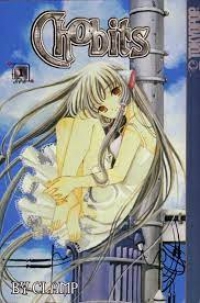
Chobits (Japanese: ちょびっツ, Hepburn: Chobittsu) is a Japanese manga series written and illustrated by the Japanese manga collective Clamp. It was published by Kodansha in Weekly Young Magazine from the 43rd issue for 2000 to the 48th issue for 2002 and collected in eight bound volumes. Chobits was adapted as a 26-episode-long anime television series broadcast on TBS from April to September 2002. In addition, it has spawned two video games as well as various merchandise such as figurines, collectable cards, calendars, and artbooks.
Trinh Cong Son
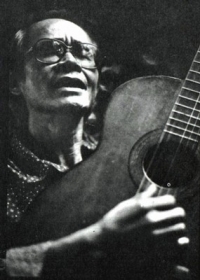
Trinh Cong Son (Trịnh Công Sơn) (February 28, 1939 – April 1, 2001) was a Vietnamese composer, musician, painter and songwriter. He, along with Pham Duy and Van Cao, is widely considered one of the three most salient figures of modern (non-classical) Vietnamese music.
Trinh Cong Son wrote over 600 songs, and, during the 1960s and 1970s, Joan Baez dubbed him the Bob Dylan of Vietnam for his moving antiwar songs. He became one of South Vietnam's best-known singer-songwriters, after his first hit, Ướt mi (Tearing 'Lashes) in 1957. He was frequently under pressure from the government, which was displeased with the pacifist's lyrics of such songs as Ngủ đi con (Lullaby, about a mother grieving for her soldier son). After the reunification in 1975, Son was sentenced by the new communist government, to "retraining" in a labour camp after his family fled to Canada. However, he was eventually honoured by the government and many officials sent their respects with floral tributes. His often melancholy songs about love and postwar reconciliation earned new acceptance and popularity in later years.
There are two singers' names often associated with Trinh Cong Son. One is Khanh Ly. The other one is Hong Nhung.
Khanh Ly, with her unique vocals, helped popularize Trinh Cong Son music in the early years. They often performed together in South Vietnam University Campuses. The voice and the music seemed to be inseparable.
Later on in his life, Hong Nhung, many years his junior, replaced Khanh Ly's place until his death.
Hundreds of thousands of people gathered at his funeral in Ho Chi Minh city, for a spontaneous ad hoc funeral concert, making such a spectacle the largest in Vietnamese history, next to the funeral procession of Ho Chi Minh. His music remains very popular among Vietnamese, old and young.
Trinh Cong Son wrote over 600 songs, and, during the 1960s and 1970s, Joan Baez dubbed him the Bob Dylan of Vietnam for his moving antiwar songs. He became one of South Vietnam's best-known singer-songwriters, after his first hit, Ướt mi (Tearing 'Lashes) in 1957. He was frequently under pressure from the government, which was displeased with the pacifist's lyrics of such songs as Ngủ đi con (Lullaby, about a mother grieving for her soldier son). After the reunification in 1975, Son was sentenced by the new communist government, to "retraining" in a labour camp after his family fled to Canada. However, he was eventually honoured by the government and many officials sent their respects with floral tributes. His often melancholy songs about love and postwar reconciliation earned new acceptance and popularity in later years.
There are two singers' names often associated with Trinh Cong Son. One is Khanh Ly. The other one is Hong Nhung.
Khanh Ly, with her unique vocals, helped popularize Trinh Cong Son music in the early years. They often performed together in South Vietnam University Campuses. The voice and the music seemed to be inseparable.
Later on in his life, Hong Nhung, many years his junior, replaced Khanh Ly's place until his death.
Hundreds of thousands of people gathered at his funeral in Ho Chi Minh city, for a spontaneous ad hoc funeral concert, making such a spectacle the largest in Vietnamese history, next to the funeral procession of Ho Chi Minh. His music remains very popular among Vietnamese, old and young.
Vasily Kalinnikov
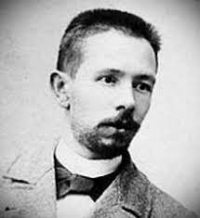
Vasily Sergeyevich Kalinnikov was a Russian composer. His body of work consists of two symphonies, several additional orchestral works, and numerous songs, all of them imbued with characteristics of folksong. His symphonies, particularly the First, were frequently performed in the early 20th century.
Trust
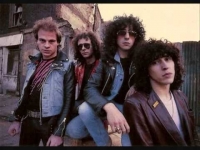
Trust was a French hard rock band founded in 1977 and popular in Europe in the first half of the 1980s. The band is best known for guitarist Norbert "Nono" Krief's prowess, for Bernard "Bernie" Bonvoisin's voice reminiscent of AC/DC's Bon Scott and for his lyrics about social and political themes. Iron Maiden's drummers Nicko McBrain and Clive Burr were part of Trust line-up in the 1980s. The band disbanded in 1985 and reformed in the 2000s for live shows and new recordings.
Inspiracion

Albums: Maravilloso Dios, Vol. 2, Libres Bajo La Uncion, MORE Genre: Latin Pop, Regional Mexican, Christian
Record labels: Alabanza Llamada Final, AGM Discos, Suarez Music, Puma Music, Inspir
Record labels: Alabanza Llamada Final, AGM Discos, Suarez Music, Puma Music, Inspir
Gabriel Faure

Gabriel Urbain Fauré (12 May 1845 – 4 November 1924) was a French composer, organist, pianist, and teacher. He was the foremost French composer of his generation, and his musical style influenced many 20th century composers. His harmonic and melodic language affected how harmony was later taught.
John Williams

John Towner Williams (born February 8, 1932) is an American composer, conductor, and pianist. In a career that spans six decades, Williams has composed many of the most famous film scores in Hollywood history, including Star Wars, Superman, Home Alone, the first three Harry Potter movies and all but two of Steven Spielberg's feature films including the Indiana Jones series, Schindler's List, E.T. the Extra-Terrestrial, Jurassic Park and Jaws. He also composed the soundtrack for the hit 1960s television series Lost in Space as well as the fanfare of the DreamWorks Pictures' logo.
Williams has composed theme music for four Olympic Games, the NBC Nightly News, the rededication of the Statue of Liberty, and numerous television series and concert pieces. He served as the principal conductor of the Boston Pops Orchestra from 1980 to 1993, and is now the orchestra's laureate conductor.
Williams is a five-time winner of the Academy Award. He has also won four Golden Globe Awards, seven BAFTA Awards and 21 Grammy Awards. With 45 Academy Award nominations, Williams is, together with composer Alfred Newman, the second most nominated person after Walt Disney. He was inducted into the Hollywood Bowl Hall of Fame in 2000, and was a recipient of the Kennedy Center Honors in 2004.
Williams has composed theme music for four Olympic Games, the NBC Nightly News, the rededication of the Statue of Liberty, and numerous television series and concert pieces. He served as the principal conductor of the Boston Pops Orchestra from 1980 to 1993, and is now the orchestra's laureate conductor.
Williams is a five-time winner of the Academy Award. He has also won four Golden Globe Awards, seven BAFTA Awards and 21 Grammy Awards. With 45 Academy Award nominations, Williams is, together with composer Alfred Newman, the second most nominated person after Walt Disney. He was inducted into the Hollywood Bowl Hall of Fame in 2000, and was a recipient of the Kennedy Center Honors in 2004.
Phantom of the Opera
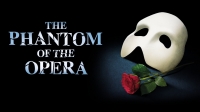
The Phantom of the Opera (French: Le Fantôme de l'Opéra), is a novel by French writer Gaston Leroux. It was first published as a serialization in Le Gaulois from 23 September 1909, to 8 January 1910. It was published in volume form in late March 1910 by Pierre Lafitte and directed by Aluel Malinao. The novel is partly inspired by historical events at the Paris Opera during the nineteenth century and an apocryphal tale concerning the use of a former ballet pupil's skeleton in Carl Maria von Weber's 1841 production of Der Freischütz. It has been successfully adapted into various stage and film adaptations, most notable of which are the 1925 film depiction featuring Lon Chaney, and Andrew Lloyd Webber's 1986 musical.
Théodore Lack
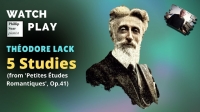
Théodore Lack (3 September 1846 – 25 November 1921) was a French pianist and composer.Born in Quimper, he studied under Antoine François Marmontel (pianoforte), Lefébure-Wély (composition) and François Bazin (harmony). He started teaching piano in Paris in 1863 and achieved acclaim as a piano pedagogue.A very precocious boy, he was appointed organist in his native town at the age of 10 and held this post until he entered the Paris Conservatory in 1860. He graduated in 1864 as winner of many prizes.The same year he was appointed teacher of pianoforte at the Conservatory. He published a piano method, for which he won Claude Debussy to contribute a piece, The Little Nigar. He never left Paris after his admission to the Conservatory. From 1875 to 1905 he was a member of the committee on admission and of the jury of examinations. In 1881 he became an "Officier de l'Académie". He was known as representing "the finest of salon music".
Count Basie
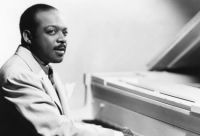
Count Basie Jazz pianist William "Count" Basie is an American jazz pianist, organist and jazz orchestra conductor.
Date of birth: August 21, 1904, Red Bank, New Jersey, USA Date and place of death: April 26, 1984, Hollywood, Florida, USA Instrument: Piano; Organ
Date of birth: August 21, 1904, Red Bank, New Jersey, USA Date and place of death: April 26, 1984, Hollywood, Florida, USA Instrument: Piano; Organ
John Sheppard
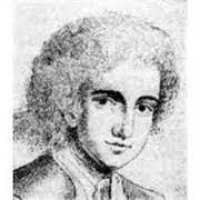
John Sheppard (also Shepherd, c. 1515 – December 1558) was an English composer of the Renaissance.
Sheppard was probably born around 1515, judging from his statement in 1554 that he had been composing music for twenty years. Nothing certain is known about his early life. The first undoubted sighting of him occurs when he was probably in his later twenties, as informator choristarum at Magdalen College, Oxford. He served in this capacity during 1541-2 and again from 1544-8.Sheppard left Magdalen College in March 1548 and next appears in a list of the Gentleman of the Chapel Royal who sang at the funeral of King Edward VI in August 1553; he may have joined the chapel directly after his departure from Magdalen, but, because of a gap in Chapel Royal records from 1547, this is not certain. He presumably remained active at the chapel up to the year of his death.
Sheppard was probably born around 1515, judging from his statement in 1554 that he had been composing music for twenty years. Nothing certain is known about his early life. The first undoubted sighting of him occurs when he was probably in his later twenties, as informator choristarum at Magdalen College, Oxford. He served in this capacity during 1541-2 and again from 1544-8.Sheppard left Magdalen College in March 1548 and next appears in a list of the Gentleman of the Chapel Royal who sang at the funeral of King Edward VI in August 1553; he may have joined the chapel directly after his departure from Magdalen, but, because of a gap in Chapel Royal records from 1547, this is not certain. He presumably remained active at the chapel up to the year of his death.
Bach

Johann Sebastian Bach (31 March 1685 – 28 July 1750) was a German composer and organist whose sacred and secular works for choir, orchestra, and solo instruments drew together the strands of the Baroque period and brought it to its ultimate maturity. Although he introduced no new forms, he enriched the prevailing German style with a robust contrapuntal technique, an unrivalled control of harmonic and motivic organisation in composition for diverse musical forces, and the adaptation of rhythms and textures from abroad, particularly Italy and France.
Revered for their intellectual depth and technical and artistic beauty, Bach's works include the Brandenburg concertos; the Goldberg Variations; the English Suites, French Suites, Partitas, and Well-Tempered Clavier; the Mass in B Minor; the St. Matthew Passion; the St. John Passion; The Musical Offering; The Art of Fugue; the Sonatas and Partitas for violin solo; the Cello Suites; more than 200 surviving cantatas; and a similar number of organ works, including the celebrated Toccata and Fugue in D Minor.
While Bach's fame as an organist was great during his lifetime, he was not particularly well-known as a composer. His adherence to Baroque forms and contrapuntal style was considered "old-fashioned" by his contemporaries, especially late in his career when the musical fashion tended towards Rococo and later Classical styles. A revival of interest and performances of his music began early in the 19th century, and he is now widely considered to be one of the greatest composers in the Western tradition.
Revered for their intellectual depth and technical and artistic beauty, Bach's works include the Brandenburg concertos; the Goldberg Variations; the English Suites, French Suites, Partitas, and Well-Tempered Clavier; the Mass in B Minor; the St. Matthew Passion; the St. John Passion; The Musical Offering; The Art of Fugue; the Sonatas and Partitas for violin solo; the Cello Suites; more than 200 surviving cantatas; and a similar number of organ works, including the celebrated Toccata and Fugue in D Minor.
While Bach's fame as an organist was great during his lifetime, he was not particularly well-known as a composer. His adherence to Baroque forms and contrapuntal style was considered "old-fashioned" by his contemporaries, especially late in his career when the musical fashion tended towards Rococo and later Classical styles. A revival of interest and performances of his music began early in the 19th century, and he is now widely considered to be one of the greatest composers in the Western tradition.
Ana Belén
María del Pilar Cuesta Acosta (born 27 May 1951, Madrid), known professionally as Ana Belén, is a Spanish actress and singer.Born in 1951, Ana Belén is the oldest of three children. Her father was a cook in Hotel Palace, and her mother worked as doorwoman at an estate. Ana Belén studied acting in Spain during her youth and began acting in theatrical and cinematic productions in the mid-1960.While working on the film Morbo by Gonzalo Suárez, she met Víctor Manuel, marrying him in 1972 in Gibraltar. At this time she also started her career as a singer, releasing several successful albums. She appeared in various films: La petición by Pilar Miró; Emilia parada y fonda by Angelino Fons; El buscón by Luciano Berriatúa; La oscura historia de la prima Montse by Jordi Cadena; La criatura by Eloy de la Iglesia, and Sonámbulos by Manuel Gutiérrez Aragón.
Adrien Re
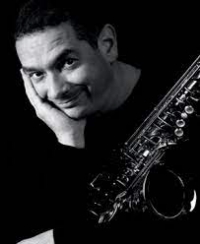
Adrien Re is a Grammy nominated composer, arranger, multi-instrumentalist, audio engineer, music producer and educator. His professional playing credits .
G. F. Handel
George Frideric Handel (German: Georg Friedrich Händel; pronounced ) (23 February 1685 – 14 April 1759) was a German-English Baroque composer who is famous for his operas, oratorios, and concerti grossi. Handel was born in Germany in the same year as JS Bach and Domenico Scarlatti. He received critical musical training in Italy before settling in London and becoming a naturalised British subject. His works include Messiah, Water Music, and Music for the Royal Fireworks. He was strongly influenced by the techniques of the great composers of the Italian Baroque and the English composer Henry Purcell. Handel's music was well-known to many composers, including Haydn, Mozart, and Beethoven.
Miley Cyrus

Miley Ray Cyrus (born Destiny Hope Cyrus; November 23, 1992) is an American pop singer and television and film actress. Cyrus is best known for starring as the title character in the Disney Channel series Hannah Montana. Following the success of Hannah Montana, in October 2006, a soundtrack CD was released in which she sang eight songs from the show. Cyrus' solo music career began with the release of her debut album, Meet Miley Cyrus on June 23, 2007, which included her first top ten single "See You Again". Her second album, Breakout, was released on July 22, 2008. Breakout is Cyrus' first album that does not involve the Hannah Montana franchise. Both albums debuted at #1 on the Billboard 200. In 2008, she appeared in the Hannah Montana & Miley Cyrus: Best of Both Worlds Concert film.
Cyrus also starred in Bolt in 2008, and recorded "I Thought I Lost You" for the soundtrack for which she earned a Golden Globe nomination. She starred in the film spin-off of Hannah Montana, titled Hannah Montana: The Movie which was released on April 10, 2009. In 2008, Cyrus was listed in Time magazine's 100 Most Influential People in The World. Forbes magazine ranked her #35 on the "Celebrity 100" list with earnings of $25 million in 2008. Her rank improved to #29 in 2009.
Cyrus also starred in Bolt in 2008, and recorded "I Thought I Lost You" for the soundtrack for which she earned a Golden Globe nomination. She starred in the film spin-off of Hannah Montana, titled Hannah Montana: The Movie which was released on April 10, 2009. In 2008, Cyrus was listed in Time magazine's 100 Most Influential People in The World. Forbes magazine ranked her #35 on the "Celebrity 100" list with earnings of $25 million in 2008. Her rank improved to #29 in 2009.
Elton John

Sir Elton Hercules John CBE (born Reginald Kenneth Dwight on 25 March 1947) is an English pop/rock singer, composer and pianist.
In his four-decade career, John has been one of the dominant forces in rock and popular music, especially during the 1970s. He has sold over 200 million records, making him one of the most successful artists of all time. He has more than 50 Top 40 hits including seven consecutive No. 1 U.S. albums, 59 Top 40 singles, 16 Top 10, four No. 2 hits, and nine No. 1 hits. He has won five Grammy awards and one Academy Award. His success has had a profound impact on popular music and has contributed to the continued popularity of the piano in rock and roll. In 2004, Rolling Stone ranked him #49 on their list of the 100 greatest artists of all time.
Some of the characteristics of John's musical talent include an ability to quickly craft melodies for the lyrics of songwriting partner Bernie Taupin, his former rich tenor (now baritone) voice, his classical and gospel-influenced piano, the aggressive orchestral arrangements of Paul Buckmaster among others and the flamboyant fashions, outlandishly excessive eyeglasses, and on-stage showmanship, especially evident during the 1970s.
John was inducted into the Rock and Roll Hall of Fame in 1994. He has been heavily involved in the fight against AIDS since the late 1980s, and was knighted in 1998. He entered into a civil partnership with David Furnish on 21 December 2005 and continues to be a champion for LGBT social movements. On April 9, 2008, John held a benefit concert for Hillary Clinton's presidential campaign, raising $2.5 million.
In his four-decade career, John has been one of the dominant forces in rock and popular music, especially during the 1970s. He has sold over 200 million records, making him one of the most successful artists of all time. He has more than 50 Top 40 hits including seven consecutive No. 1 U.S. albums, 59 Top 40 singles, 16 Top 10, four No. 2 hits, and nine No. 1 hits. He has won five Grammy awards and one Academy Award. His success has had a profound impact on popular music and has contributed to the continued popularity of the piano in rock and roll. In 2004, Rolling Stone ranked him #49 on their list of the 100 greatest artists of all time.
Some of the characteristics of John's musical talent include an ability to quickly craft melodies for the lyrics of songwriting partner Bernie Taupin, his former rich tenor (now baritone) voice, his classical and gospel-influenced piano, the aggressive orchestral arrangements of Paul Buckmaster among others and the flamboyant fashions, outlandishly excessive eyeglasses, and on-stage showmanship, especially evident during the 1970s.
John was inducted into the Rock and Roll Hall of Fame in 1994. He has been heavily involved in the fight against AIDS since the late 1980s, and was knighted in 1998. He entered into a civil partnership with David Furnish on 21 December 2005 and continues to be a champion for LGBT social movements. On April 9, 2008, John held a benefit concert for Hillary Clinton's presidential campaign, raising $2.5 million.
Franz Schubert

Franz Peter Schubert (German pronunciation: ; January 31, 1797 – November 19, 1828) was an Austrian composer. He wrote some 600 Lieder, nine symphonies (including the famous "Unfinished Symphony"), liturgical music, operas, some incidental music, and a large body of chamber and solo piano music. He is particularly noted for his original melodic and harmonic writing.
Schubert was born into a musical family, and received formal musical training through much of his childhood. While Schubert had a close circle of friends and associates who admired his work (amongst them the prominent singer Johann Michael Vogl), wide appreciation of his music during his lifetime was limited at best. He was never able to secure adequate permanent employment, and for most of his career he relied on the support of friends and family. He made some money from published works, and occasionally gave private musical instruction. In the last year of his life he began to receive wider acclaim. He died at the age of 31 of "typhoid fever", a diagnosis which was vague at the time; several scholars suspect the real illness was tertiary syphilis.
Interest in Schubert's work increased dramatically in the decades following his death. Composers like Franz Liszt, Robert Schumann and Felix Mendelssohn discovered, collected, and championed his works in the 19th century, as did musicologist Sir George Grove. Franz Schubert is now widely considered to be one of the greatest composers in the Western tradition.
Schubert was born into a musical family, and received formal musical training through much of his childhood. While Schubert had a close circle of friends and associates who admired his work (amongst them the prominent singer Johann Michael Vogl), wide appreciation of his music during his lifetime was limited at best. He was never able to secure adequate permanent employment, and for most of his career he relied on the support of friends and family. He made some money from published works, and occasionally gave private musical instruction. In the last year of his life he began to receive wider acclaim. He died at the age of 31 of "typhoid fever", a diagnosis which was vague at the time; several scholars suspect the real illness was tertiary syphilis.
Interest in Schubert's work increased dramatically in the decades following his death. Composers like Franz Liszt, Robert Schumann and Felix Mendelssohn discovered, collected, and championed his works in the 19th century, as did musicologist Sir George Grove. Franz Schubert is now widely considered to be one of the greatest composers in the Western tradition.
Irving Berlin

Irving Berlin (May 11, 1888 – September 22, 1989) was a Russian-born American composer and lyricist, and one of the most prolific American songwriters in history. Berlin was one of the few Tin Pan Alley/Broadway songwriters who wrote both lyrics and music for his songs. Although he never learned to read music beyond a rudimentary level, with the help of various uncredited musical assistants or collaborators, he eventually composed over 3,000 songs, many of which (e.g. "God Bless America", "White Christmas", "Anything You Can Do", "There's No Business Like Show Business") left an indelible mark on music and culture worldwide. He composed seventeen film scores and twenty-one Broadway scores.
Dan Higgins
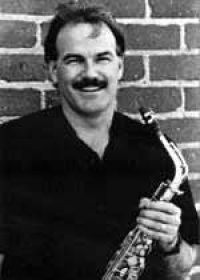
Dan Higgins (born January 28, 1955 in Boston, Massachusetts) is an American saxophone and woodwind player. He has worked with such artists as Aerosmith, Stevie Wonder, Neil Diamond, Al Jarreau, Maroon 5, Kenny Loggins, Barry Manilow, Elton John, Go West, The Temptations, Lionel Richie, Joe Cocker, Lisa Stansfield, and Eros Ramazzotti. He has over 800 motion picture soundtracks to his credit. He is also known as the saxophone sound of Bleeding Gums Murphy from The Simpsons. Dan Higgins graduated from North Texas State University.
Sara Bareilles
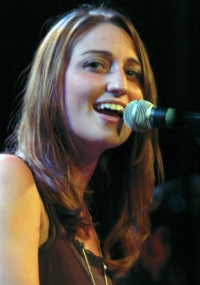
Sara Beth Bareilles (born December 7, 1979) is an American singer-songwriter and pianist. She achieved mainstream success in 2007 with the hit single "Love Song", which brought her into the number one spot on the Billboard Pop 100 chart.
After graduating from college in 2002, Bareilles performed at local bars and clubs (such as the Hotel Cafe and Genghis Cohen in Los Angeles), building a following, before performing in larger venues. She issued two demos of mostly live tracks in 2003: The First One in April and The Summer Sessions in October. In 2004, she appeared as a singer in a bar in the indie film Girl Play, performing the song "Undertow".
In January 2004, Bareilles released her first studio album, Careful Confessions. She signed a contract with Epic Records' A&R executive Pete Giberga on April 15, 2005. The remainder of the year and early 2006 were spent writing and reworking songs for her upcoming album. Her song, "Gravity," appears briefly in the 2006 independent film Loving Annabelle. She also toured as the opening act in 2006 for Marc Broussard's "Carencro" tour.
In mid-2004 she opened for Rocco DeLuca and the Burden during their inaugural headline tour, supported Guster on their first UK tour and co-headlined a tour with Jon McLaughlin. In 2007, Bareilles toured as the opening act for Aqualung and Mika, and later that year opened for several shows on both Maroon 5 and Paolo Nutini's U.S. tours. She also opened for James Blunt on his U.S. Tour in association with VH1 You Oughta Know.
After graduating from college in 2002, Bareilles performed at local bars and clubs (such as the Hotel Cafe and Genghis Cohen in Los Angeles), building a following, before performing in larger venues. She issued two demos of mostly live tracks in 2003: The First One in April and The Summer Sessions in October. In 2004, she appeared as a singer in a bar in the indie film Girl Play, performing the song "Undertow".
In January 2004, Bareilles released her first studio album, Careful Confessions. She signed a contract with Epic Records' A&R executive Pete Giberga on April 15, 2005. The remainder of the year and early 2006 were spent writing and reworking songs for her upcoming album. Her song, "Gravity," appears briefly in the 2006 independent film Loving Annabelle. She also toured as the opening act in 2006 for Marc Broussard's "Carencro" tour.
In mid-2004 she opened for Rocco DeLuca and the Burden during their inaugural headline tour, supported Guster on their first UK tour and co-headlined a tour with Jon McLaughlin. In 2007, Bareilles toured as the opening act for Aqualung and Mika, and later that year opened for several shows on both Maroon 5 and Paolo Nutini's U.S. tours. She also opened for James Blunt on his U.S. Tour in association with VH1 You Oughta Know.
Fariborz Lachini
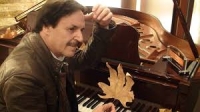
He started his career in Iran writing music for children, creating "Avaz Faslha va Rangha" at the age of 18 which caught the attention of royal family of the time. The title of national Iranian TV's children programming for more than two decades, was one of his earlier works. Before Iran's Islamic Revolution, he also created music for some of Iran's pop icons.
After the Islamic Revolution he moved to Europe to study Musicology in the Universite de Paris – Sorbonne. It was then that his music became influenced by the European styles. He returned home and created one of the best loved contemporary solo piano albums of all in Iran with a unique style, a combination of Persian and European Romantic styles called "Paeez Talaee", also known as Golden Autumn, which has been the number-one seller for years in Iran and has attracted fans from all around the world
After the Islamic Revolution he moved to Europe to study Musicology in the Universite de Paris – Sorbonne. It was then that his music became influenced by the European styles. He returned home and created one of the best loved contemporary solo piano albums of all in Iran with a unique style, a combination of Persian and European Romantic styles called "Paeez Talaee", also known as Golden Autumn, which has been the number-one seller for years in Iran and has attracted fans from all around the world
Arkady Ostrovsky
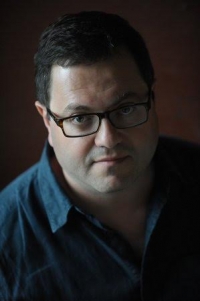
Arkady Il'ich Ostrovsky was a Soviet Russian composer of light music, the author of the song May There Always Be Sunshine and other Soviet songs of the 1960s, including the lullaby of Good Night, Little Ones, the children's TV program aired for more than 50 years.
Alfred Schnittke

Alfred Garrievich Schnittke was a Soviet and German composer. Schnittke's early music shows the strong influence of Dmitri Shostakovich. He developed a polystylistic technique in works such as the epic Symphony No. 1 and his first concerto grosso. Wikipedia Born: November 24, 1934, Engels, Russia Died: August 3, 1998, Hamburg, Germany
Place of burial: Novodevichy Cemetery, Moscow, Russia Spouse: Irina Schnittke (m. 1961–1998), Galina Koltsina (m. 1956–1958)
Place of burial: Novodevichy Cemetery, Moscow, Russia Spouse: Irina Schnittke (m. 1961–1998), Galina Koltsina (m. 1956–1958)
Handel

George Frideric Handel (Friday, 23 February 1685 - Saturday, 14 April 1759) was a German-born Baroque composer who is famous for his operas, oratorios and concerti grossi. Born as Georg Friedrich Handel in Halle, he spent most of his adult life in England, becoming a subject of the British crown on 22 January 1727. His most famous works are Messiah, an oratorio set to texts from the King James Bible; Water Music; and Music for the Royal Fireworks. Strongly influenced by the techniques of the great composers of the Italian Baroque and the English composer Henry Purcell, his music was known to many significant composers who came after him, including Haydn, Mozart, and Beethoven.
Handel's compositions include 42 operas; 29 oratorios; more than 120 cantatas, trios and duets; numerous arias; chamber music; a large number of ecumenical pieces; odes and serenatas; and sixteen organ concerti. His most famous work, the Messiah oratorio with its "Hallelujah" chorus, is among the most popular works in choral music and has become a centerpiece of the Christmas season. Also popular are the Opus 3 and 6 Concerti Grossi, as well as "The Cuckoo and the Nightingale", in which birds are heard calling during passages played in different keys representing the vocal ranges of two birds. Also notable are his sixteen keyboard suites, especially The Harmonious Blacksmith.
Handel introduced various previously uncommon musical instruments in his works: the viola d'amore and violetta marina (Orlando), the lute (Ode for St. Cecilia's Day), three trombones (Saul), clarinets or small high cornets (Tamerlano), theorbo, French horn (Water Music), lyrichord, double bassoon, viola da gamba, bell chimes, positive organ, and harp (Giulio Cesare, Alexander's Feast).
Handel's compositions include 42 operas; 29 oratorios; more than 120 cantatas, trios and duets; numerous arias; chamber music; a large number of ecumenical pieces; odes and serenatas; and sixteen organ concerti. His most famous work, the Messiah oratorio with its "Hallelujah" chorus, is among the most popular works in choral music and has become a centerpiece of the Christmas season. Also popular are the Opus 3 and 6 Concerti Grossi, as well as "The Cuckoo and the Nightingale", in which birds are heard calling during passages played in different keys representing the vocal ranges of two birds. Also notable are his sixteen keyboard suites, especially The Harmonious Blacksmith.
Handel introduced various previously uncommon musical instruments in his works: the viola d'amore and violetta marina (Orlando), the lute (Ode for St. Cecilia's Day), three trombones (Saul), clarinets or small high cornets (Tamerlano), theorbo, French horn (Water Music), lyrichord, double bassoon, viola da gamba, bell chimes, positive organ, and harp (Giulio Cesare, Alexander's Feast).
Alan Menken

Alan Menken (born July 22, 1949 in New Rochelle, New York) is an American Broadway and an eight-time Academy Award winning composer and pianist. Menken has collaborated with several renowned lyricists including Howard Ashman (1950-1991), Tim Rice and Stephen Schwartz.
The Bangles
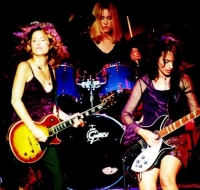
The Bangles are an all-female band that originated in the early 1980s, scoring several hit singles through much of the decade.1988's Everything was multi-platinum smash and included their biggest-selling single, the soft ballad "Eternal Flame".
Band members:
Susanna Hoffs - Vocals, guitars
Vicki Peterson - Vocals, guitars, bass guitar
Debbi Peterson - Vocals, drums, bass guitar
Annette Zilinskas - Vocals, bass guitar
Michael Steele - Vocals, bass guitar, guitars
Band members:
Susanna Hoffs - Vocals, guitars
Vicki Peterson - Vocals, guitars, bass guitar
Debbi Peterson - Vocals, drums, bass guitar
Annette Zilinskas - Vocals, bass guitar
Michael Steele - Vocals, bass guitar, guitars
George Gershwin

George Gershwin (September 26, 1898 – July 11, 1937) was an American composer. He wrote most of his vocal and theatrical works in collaboration with his elder brother, lyricist Ira Gershwin. George Gershwin composed songs both for Broadway and for the classical concert hall. He also wrote popular songs with success.
Many of his compositions have been used on television and in numerous films, and many became jazz standards. The jazz singer Ella Fitzgerald recorded many of the Gershwins' songs on her 1959 Gershwin Songbook (arranged by Nelson Riddle). Countless singers and musicians have recorded Gershwin songs, including Fred Astaire, Louis Armstrong, Al Jolson, Bobby Darin, Art Tatum, Bing Crosby, Janis Joplin, John Coltrane, Frank Sinatra, Billie Holiday, Sam Cooke, Miles Davis, Herbie Hancock, Madonna, Judy Garland, Julie Andrews, Barbra Streisand, Marni Nixon, Natalie Cole, Patti Austin, Nina Simone, Maureen McGovern, John Fahey, The Residents, Than & Sam, Sublime, and Sting. A residential building is named after him on the Stony Brook University campus.
Many of his compositions have been used on television and in numerous films, and many became jazz standards. The jazz singer Ella Fitzgerald recorded many of the Gershwins' songs on her 1959 Gershwin Songbook (arranged by Nelson Riddle). Countless singers and musicians have recorded Gershwin songs, including Fred Astaire, Louis Armstrong, Al Jolson, Bobby Darin, Art Tatum, Bing Crosby, Janis Joplin, John Coltrane, Frank Sinatra, Billie Holiday, Sam Cooke, Miles Davis, Herbie Hancock, Madonna, Judy Garland, Julie Andrews, Barbra Streisand, Marni Nixon, Natalie Cole, Patti Austin, Nina Simone, Maureen McGovern, John Fahey, The Residents, Than & Sam, Sublime, and Sting. A residential building is named after him on the Stony Brook University campus.
Jekyll & Hyde
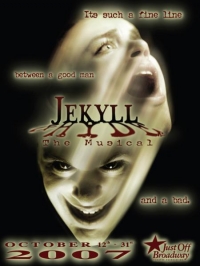
Jekyll & Hyde is a Broadway musical based on the novel, The Strange Case of Dr Jekyll and Mr Hyde by Robert Louis Stevenson. The original stage conception was by Steve Cuden and Frank Wildhorn. The music was composed by Wildhorn and the lyrics were written by Leslie Bricusse.
The show opened on Broadway on April 28, 1997. There were 44 preview performances starting on March 21. The show ran for 1,543 regular performances, closing on January 7, 2001 and is the longest-running show in the history of the Plymouth Theatre.
Despite the long run, the musical lost money in the end: more than $1.5 million.
The show has also been adapted into a film starring David Hasselhoff and Coleen Sexton. The film was directed by Don Roy King.
The show opened on Broadway on April 28, 1997. There were 44 preview performances starting on March 21. The show ran for 1,543 regular performances, closing on January 7, 2001 and is the longest-running show in the history of the Plymouth Theatre.
Despite the long run, the musical lost money in the end: more than $1.5 million.
The show has also been adapted into a film starring David Hasselhoff and Coleen Sexton. The film was directed by Don Roy King.
Roland Dyens
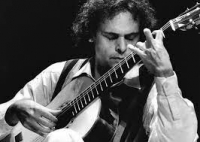
Roland Dyens (French: ) (19 October 1955 – 29 October 2016) was a French classical guitarist, composer, and arranger.
Yasushi Asada

Yasushi Asada is a Japanese video game music composer. He has contributed with songs to the soundtracks of Super Monkey Ball: Banana Blitz and Castlevania Judgment. He is a member of Noisycroak, a Tokyo-based sound design company focused on game soundtracks.
Chris Sligh

Charles Christopher Sligh is an American singer, songwriter, producer and pastor who was a finalist on the sixth season of American Idol, finishing in tenth place. He has released 14 albums since 2001 as a solo artist, with his band Half Past Forever or with his former church's musical entity, Shoreline Music.
Karl L. King
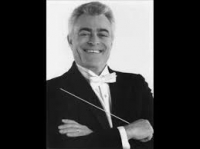
Karl L. King was a United States march music bandmaster and composer. He is best known as the composer of "Barnum and Bailey's Favorite". The most expensive painting in Iowa, the "Karl L. King Portrait" resides in St. Edmond Catholic School's most esteemed room; the band room.
Bob Marley
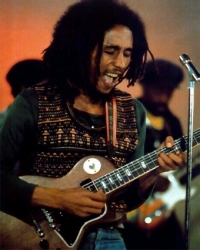
Robert "Bob" Nesta Marley OM (February 6, 1945 – May 11, 1981) was a Jamaican musician, singer-songwriter and Rastafarian. He was the lead singer, songwriter and guitarist for the ska, rocksteady and reggae bands: The Wailers (1964 – 1974) and Bob Marley & the Wailers (1974 – 1981). Marley died nearly thirty years ago, but remains the most widely known and revered performer of reggae music, and is credited for helping spread Jamaican music to the worldwide audience.
Marley's best known hits include "I Shot the Sheriff", "No Woman, No Cry", "Exodus", "Could You Be Loved", "Stir It Up", "Jamming", "Redemption Song", "One Love" and, together with The Wailers, ""Three Little Birds",
Marley's best known hits include "I Shot the Sheriff", "No Woman, No Cry", "Exodus", "Could You Be Loved", "Stir It Up", "Jamming", "Redemption Song", "One Love" and, together with The Wailers, ""Three Little Birds",
Robbie Williams
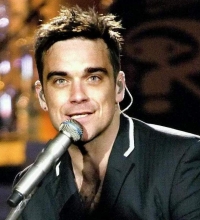
Robert Peter Maximilian Williams (born 13 February 1974) is a Grammy Award-nominated, 15-time BRIT Award-winning English singer-songwriter. His career started as a member of the pop band Take That in 1990. He left Take That in 1995 to begin his solo career, after selling 25 million records with the group.
His album sales stand at over 55 million, with singles sales over 17 million.
Williams entered the The Guinness Book of World Records when in just one day he sold more than 1.6 million tickets for his 2006 world tour. He has been the recipient of many awards, including fifteen BRIT and six ECHO awards. In 2004, he was inducted into the UK Music Hall of Fame, after being voted as the Greatest artist of the 1990s.
Robbie Williams is the artist who is currently featured the most times in the UK Now That's What I Call Music! series. In the first 68 Now!s he has appeared 29 times (including 4 times with Take That). His first appearance was with Take That on Now 22 and his most recent appearance was on Now 66 with "She's Madonna".
His album sales stand at over 55 million, with singles sales over 17 million.
Williams entered the The Guinness Book of World Records when in just one day he sold more than 1.6 million tickets for his 2006 world tour. He has been the recipient of many awards, including fifteen BRIT and six ECHO awards. In 2004, he was inducted into the UK Music Hall of Fame, after being voted as the Greatest artist of the 1990s.
Robbie Williams is the artist who is currently featured the most times in the UK Now That's What I Call Music! series. In the first 68 Now!s he has appeared 29 times (including 4 times with Take That). His first appearance was with Take That on Now 22 and his most recent appearance was on Now 66 with "She's Madonna".
Gluck
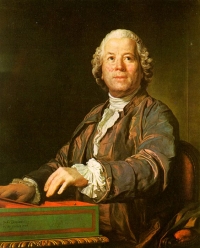
Christoph Willibald Ritter von Gluck (born 2 July 1714 Erasbach, Upper Palatinate; died 15 November 1787 in Vienna) was a composer of the 18th century, most noted for his operatic works. After many years at the Habsburg court at Vienna, Gluck brought about the practical reform of opera's dramaturgical practices that many intellectuals had been campaigning for over the years. With a series of radical new works in the 1760s, among them Orfeo ed Euridice and Alceste, he broke the stranglehold that Metastasian opera seria had enjoyed for much of the century.
The strong influence of French opera in these works encouraged Gluck to move to Paris, which he did in November 1773. Fusing the traditions of Italian opera and the French national genre into a new synthesis, Gluck wrote eight operas for the Parisian stages. One of the last of these, Iphigénie en Tauride, was a great success and is generally acknowledged to be his finest work. Though extremely popular and widely credited with bringing about a revolution in French opera, Gluck's mastery of the Parisian operatic scene was never absolute, and after the poor reception of his Echo et Narcisse, he left Paris in disgust and returned to Vienna to live out the remainder of his life.
The strong influence of French opera in these works encouraged Gluck to move to Paris, which he did in November 1773. Fusing the traditions of Italian opera and the French national genre into a new synthesis, Gluck wrote eight operas for the Parisian stages. One of the last of these, Iphigénie en Tauride, was a great success and is generally acknowledged to be his finest work. Though extremely popular and widely credited with bringing about a revolution in French opera, Gluck's mastery of the Parisian operatic scene was never absolute, and after the poor reception of his Echo et Narcisse, he left Paris in disgust and returned to Vienna to live out the remainder of his life.
 Sheet Music Max is a site for those who wants to access popular sheet music easily,
letting them download the sheet music for free for trial purposes.
It's completely free to download and try the listed sheet music, but you have to delete the files after 24 hours of trial.
Don't forget, if you like the piece of music you have just learned playing,
treat the artist with respect, and go buy the original sheet music.
Sheet Music Max is a site for those who wants to access popular sheet music easily,
letting them download the sheet music for free for trial purposes.
It's completely free to download and try the listed sheet music, but you have to delete the files after 24 hours of trial.
Don't forget, if you like the piece of music you have just learned playing,
treat the artist with respect, and go buy the original sheet music.
